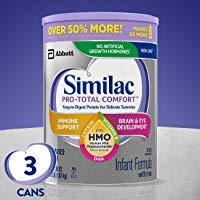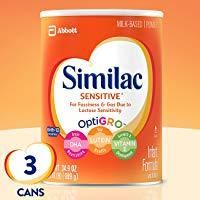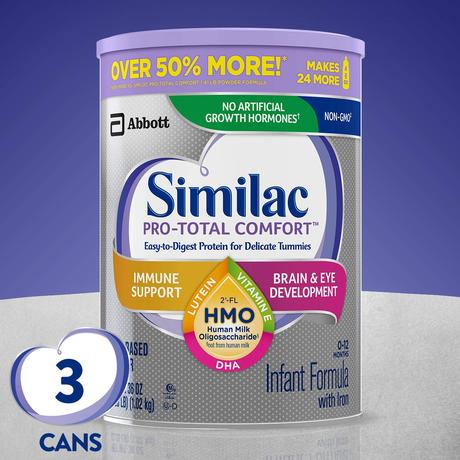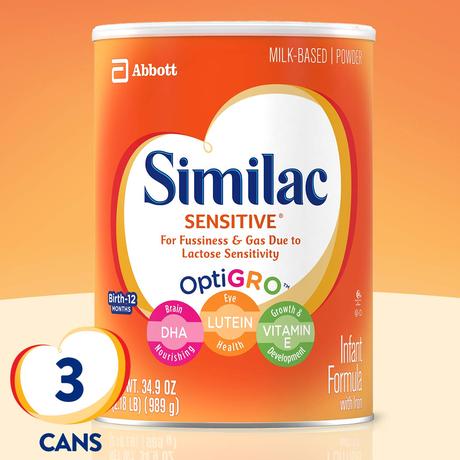Finding the right formula is so important. Every parent wants to find a formula that is closest to breast milk.
You want your child to be full, happy and growing properly.
The goal is to find a formula that supports your infant’s growth and immune system.
When your child is unable to handle a traditional formula, it can be frustrating.
There are so many types of formulas with all different types of ingredients to consider.
If your baby is dealing with fussiness, spit-up and gas, Similac has some good options.
So how do you choose which formula is right for you and your baby?
Let’s take a look at Similac Pro-Total Comfort vs Similac Sensitive.
The Big Difference
There are a few big differences between Similac Pro-Total Comfort and Similac Sensitive.
The main ingredients are different and the added prebiotics are different.
The two formulas also use different parts of the milk protein.
Similac Pro-Total Comfort contains 2’-FL Human Milk Oligosaccharide (prebiotic), corn maltodextrin and whey protein.
Similac Sensitive adds prebiotics, corn syrup as the main ingredient and uses a whole milk protein that has been isolated to remove the lactose.
Similac Pro-Total Comfort
#1 2’-FL Human Oligosaccharide = Prebiotic to Improve Immune System and Aid Digestion
#2 Corn Maltodextrin first ingredient = Less sugar
#3 Whey Protein Only = Easier to Digest and Lactose-Free
Similac Sensitive
#1 Prebiotics and Nucleotides = Supports Immune System and Digestion
#2 Corn Syrup first ingredient = More Sugar
#3 Milk Protein Isolate = Whole Milk Protein and Lactose-Free
A Detailed Look
**Some links on this page can take you to Amazon.com, where you can see prices, customer reviews, product specs, etc … Please note that we only share stuff we love. We may earn a small commission if you buy through our links.
Product Satisfaction Rate Review


Similac Pro-Total Comfort

Buy From Amazon
Read Customer Reviews Here
Let’s break this down a little further.
This formula has an added 2’-FL Human Milk Oligosaccharide. This is a prebiotic found in human breast milk.
Years of research have gone into identifying this prebiotic so that it can be replicated and added to the formula to boost your baby’s immune system.
This prebiotic’s profile is identical to that found in human breast milk, but please note that the prebiotic in this formula is not taken from a human.
Research has shown that your baby will have a healthier immune system because of the good bacteria that this formula puts into your baby’s digestive tract.
Your baby will have an immune system similar to that of a breastfed baby.
The main ingredient in Similac Pro-Total Comfort is corn maltodextrin and the second ingredient is whey protein hydrolysate.
What is corn maltodextrin you ask?
Corn maltodextrin is made from corn and it contains less than 20% of sugar.
Corn maltodextrin is a thickener that helps the formula have the texture of milk.
The corn maltodextrin is also a starch that will give your baby energy, without the added sugar or corn syrup.
Whey protein hydrolysate is an important ingredient in this formula.
Similac Pro-Total Comfort has 100% whey protein that has been heated to break down the amino bonds of the protein.
This acts like pre-digestion and makes the formula proteins easier for the baby’s digestive tract to absorb.
This form of protein is easier for the body to digest.
The traditional formula keeps the whey protein intact which may cause stomach upset for many babies.
Please note that there is another very similar formula to the Pro-Total Comfort, you can find on stores known as Similac Total Comfort.
The only difference between the two is that the first one has 2’‐FL Human Milk Oligosaccharide and the prebiotic, fructooligosaccharide (FOS).
Similac Total Comfort has the prebiotic, galactooligosaccharides (GOS) and does not contain 2’-FL Human Milk Oligosaccharides.
Similac Sensitive

Buy From Amazon
Read Customer Reviews Here
Similac Sensitive has added prebiotics and nucleotides.
These prebiotics and nucleotides are similar to those found in breast milk, but they are not as identical as the prebiotics that are being added to Similac Pro-Total Comfort.
Nevertheless, the prebiotics in Similac Sensitive do their intended job. The prebiotics help your baby’s digestive tract.
The nucleotides also give your baby a healthy immune system.
The prebiotics and nucleotides are designed to go straight to your baby’s digestive tract to improve overall health.
Similac Sensitive’s first ingredient is corn syrup.
This corn syrup is different from high fructose corn syrup so don’t panic. The corn syrup in is dehydrated to remove all the water.
What you have left is a white powder that is primarily glucose polymers that are easier to digest than milk and they give your baby energy.
Corn syrup acts as a sweetener since your baby cannot handle lactose which is milk sugar.
Similac Sensitive does have more sugar than Similac Pro-Total Comfort because of the corn syrup.
The second ingredient is a whole milk protein isolate.
The milk protein has had the lactose and certain minerals removed to make the formula more tolerable to infants who cannot handle lactose.
Similac Pro-Total Comfort vs Similac Sensitive
So, what we are seeing here is that Similac Sensitive is a slightly different formulation than Similac Pro-Total Comfort.
Similac Sensitive has prebiotics and nucleotides that do the same thing as 2’-FL Human Oligosaccharide, but they are not as close to human breast milk as the other formula.
Pro-Total Comfort contains 2’-FL Human Oligosaccharide which has been researched for years and is finally perfected to be just like the prebiotics in human breast milk.
Similac Pro-Total Comfort vs Similac Sensitive has revealed to us that the Pro-Total Comfort uses corn maltodextrin which means it has less sugar than the corn syrup in Similac Sensitive.
Pro-Total Comfort is also easier to digest than Similac Sensitive because whey protein is easier to digest than the whole milk protein (even though the lactose has been extracted).
Nutrition Wise
Similac Pro-Total Comfort vs Similac Sensitive nutrition facts.
Both contain DHA, Lutein and Vitamin E.
Similac Sensitive refers to this combo as OptiGro.
DHA supports brain development.
Lutein is added to help your baby have healthy eyes and Vitamin E helps the growth of your baby’s developing cells.
These two formulas are created to aid in the development and growth of your baby with a gentler approach for the baby that is sensitive to the traditional milk-based formula.
Both formulas offer the same caloric intake.
Similac Pro-Total Comfort and Similac Sensitive are both milk-based formulas.
Both formulas have been developed to help your baby grow and mature to his/her full potential.
Nutrients per 100 Calories ~ (5 fl oz)
- Similac Sensitive Similac Pro-Total Comfort
Protein 2.1 g 2.32 g
Fat 5.4 g 5.4 g
Carbohydrate 11.1 g 11
Water 140 g 141
Linoleic Acid 1000 mg 1000 mg
Vitamin A 300 IU 300 IU
Vitamin D 60 IU 60 IU
Vitamin E 1.5 IU 1.5 IU
Vitamin K 8 mcg 8 mcg
Thiamin (Vitamin B1) 100 mcg 100 mcg
Riboflavin (Vitamin B2) 160 mcg 160 mcg
Vitamin B6 63 mcg 63 mcg
Vitamin B12 0.26 mcg 0.26 mcg
Niacin 1100 mcg 1100 mcg
Folic Acid (Folacin) 16 mcg 16 mcg
Pantothenic Acid 470 mcg 470 mcg
Biotin 4.6 mcg 4.6 mcg
Vitamin C (Ascorbic Acid) 9 mg 9 mg
Choline 24 mg 24 mg
Inositol 4.5 mg 4.5 mg
Calcium 88 mg 105 mg
Phosphorus 59 mg 70 mg
Magnesium 6 mg 6 mg
Iron 1.9 mg 1.9 mg
Zinc 0.79 mg 0.79 mg
Manganese 5 mcg 5 mcg
Copper 95 mcg 95 mcg
Iodine 9 mcg 9 mcg
Selenium 2 mcg 2 mcg
Sodium 32 mg 46 mg
Potassium 110 mq 121 mg
Chloride 68 mq 68 mg
Consider and Decide
When considering Similac Pro-Total Comfort vs Similac Sensitive you may be curious about the cost.
These two formulas actually cost the same. Choosing the ingredients that you find most important will help you decide.
If you suspect that your baby is very sensitive to lactose, you may want to err on the side of caution and go straight for the Similac Pro-Total Comfort.
The whey protein makes Pro-Total Comfort easier to digest.
Similac Sensitive is a good option if you feel your baby needs a lactose free formula that is closer to the regular formula.
When choosing you should consider the prebiotic added, amount of sugar and the type of milk protein used in the formula.
In the end, your baby will decide what is best for his/her body.
You have now done your research. All you can do is see which type of formula your infant tolerates best.
Choose a formula and allow trial and error to take place. Your baby’s body will let you know which formula to choose.
Don’t get frustrated by the process.
Take your time, enjoy the days of infancy, try new formulas and find the right one for your baby.
Additional information:
- What’s The Difference Between Similac Sensitive and Enfamil Gentlease?
Photo credits: Amazon
